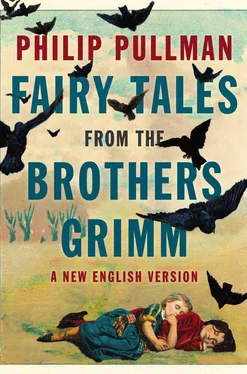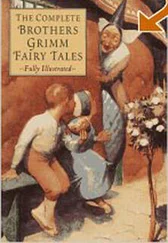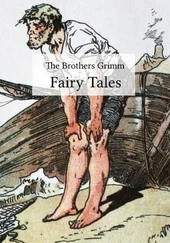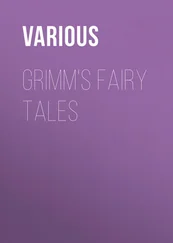‘We’re finer than we were before —
We shan’t be cobblers any more!’
They leaped about like a pair of kittens, on the chairs, the bench, the hearth, the windowsill, and finally they darted under the door and were gone.
They never came back, but the shoemaker prospered. All his work went well from then on, and he and his wife lived happy and wealthy till the end of their days.
Second Story
Once there was a poor servant girl who always worked hard and was diligent and neat in all she did. Every day she would sweep out the house and pile the rubbish outside the back door.
One morning, just as she was about to start work, she saw a letter in among the rubbish. Since she couldn’t read, she stood her broom in the corner and took the letter to her mistress. It turned out to be an invitation from the elves, inviting the girl to stand as godmother at the forthcoming baptism of an elf-child.
‘I don’t know what to do, ma’am!’ she said.
‘No, it’s difficult, Gretchen,’ said her mistress. ‘But I’ve heard that it’s not right to turn down an invitation from the elves. I think you should accept.’
‘Well, if you say so, ma’am,’ said Gretchen.
The mistress helped her write a letter accepting the invitation. She left it where she’d found the other one, and when her back was turned, it vanished; and shortly afterwards three elves turned up and led her to a hollow mountain. She had to bend her head a little to go in, but once she was inside she was amazed at the beauty of everything she saw, which was delicate and precious beyond description.
The new mother was lying on a bed of the blackest ebony inset with pearly shells. The counterpane was embroidered with gold thread, the cradle was of ivory, and the little bathtub of solid gold. The baby was no bigger than her little fingernail.
The girl stood in as godmother, and then she asked to go back home, because she was needed to work the next day; but the elves pleaded with her to stay with them, just for three days. They were so persuasive and so friendly that she gave in, and had a fine time; they did everything they could to make her happy.
When three days had gone by she told them that she really must return home. They filled her pockets with gold and led her outside. She set off homewards, and reached the house late in the morning, finding her broom still in the corner where she’d left it. She picked it up and started sweeping as usual, but was astonished when some strangers came out of the house and asked her what she was doing. It turned out that her old employer had died, and she hadn’t spent three days in the mountain, as she’d thought, but seven years.
Third Story
A mother had her baby stolen from his cradle by the elves, and in his place they laid a changeling, a little monster with a great thick head and staring eyes who did nothing but eat and drink.
In distress she went to a neighbour and asked her advice. The neighbour told her to take the changeling into the kitchen, lay him on the hearth, and make a fire. Then she should take two eggshells and boil some water in them. That would make the changeling laugh, and as soon as he laughed, it would be all up with him.
The woman did everything just as her neighbour said. And when she put the eggshells on the fire to boil, the blockhead sang out:
‘I’m as old
As the Westerwald,
But I’ve never seen anyone try to boil water in an eggshell!’
And he roared with laughter. As soon as he did that, a crowd of little elves appeared, carrying the rightful child. They set him on the hearth and took the changeling away, and the woman never saw them again.
* * *
Tale type:First story: ATU 503, ‘The Gifts of the Little People’; second story: ATU 476, ‘Midwife in the Underworld’; third story: AT 504, ‘The Changeling’
Source:all three tales told to the Grimm brothers by Dortchen Wild
Similar stories:Katharine M. Briggs: ‘Food and Fire and Company’, ‘Goblin Combe’, ‘That’s Enough to Go On With’, ‘The Two Humphs’ ( Folk Tales of Britain ); Italo Calvino: ‘The Two Hunchbacks’ ( Italian Folktales )
This is a group of the very few fairy tales in Grimm that actually feature fairies. Whatever we call this sort of supernatural being, elves, fairies or (the usual name for them in Britain) brownies, there are definite points of etiquette to bear in mind when dealing with them. Katharine M. Briggs, the great authority on British folk tales, says, ‘Any offer of reward for its services drove the brownie away; it seemed to be an absolute taboo’ ( A Dictionary of Fairies , p. 46). However, that seems to be contradicted by her story ‘That’s Enough to Go On With’, in which the polite children are rewarded and the rude farmer punished. Perhaps you just have to be lucky as well as careful.
The second and third tales here are little more than anecdotes, as we have them, though of course they could be elaborated. The first is the most familiar: some readers might recognize a shadowy resemblance to Beatrix Potter’s The Tailor of Gloucester (1902).
TWENTY-TWO
THE ROBBER BRIDEGROOM
There was once a miller who had a beautiful daughter. When she came of age to be married, he thought he should look out for a suitable husband for her. ‘If anyone respectable comes along,’ he said to himself, ‘I’ll give her to him.’
Word got around, and before long a gentleman appeared to ask about this beautiful daughter. The miller interviewed him, found no fault with him, and promised that he could marry her.
However, the daughter didn’t take to him at all. There was something about him she didn’t trust, and what’s more, whenever she thought about him or heard his name mentioned, she felt her heart contract with horror.
One day the prospective bridegroom said to her, ‘You know, my dear, we’re engaged to be married, but you’ve never paid me a visit. Why not come to my house? After all, it will soon be your own home.’
‘I don’t know where your house is,’ the girl said.
‘It’s out in the forest,’ he told her. ‘A beautiful situation, you’ll see.’
‘I don’t think I’ll ever be able to find my way there,’ she said.
‘No, no, you must come on Sunday. I’ve already invited some guests — they’re looking forward to meeting you. I’ll make a trail of ashes, so you can follow it through the trees.’
On Sunday the girl felt an awful foreboding; she’d rather do anything than set off through the woods to the bridegroom’s house. She filled her pockets with peas, to mark the trail in case anything happened. At the edge of the forest she found the trail of ashes, and after every step she threw a couple of peas to left and right. She walked almost the whole day till she came to a part of the forest where the trees grew so thick and high that it was dark underneath them, and there, right in the heart of the woods, she found the bridegroom’s house. It was dark and silent and seemed to be deserted; there was no one inside but a bird in a cage, and he was no comfort either, because all he could sing was:
‘Turn back! Get out! Go home! Take care!
This is a murderer’s house! Beware!’
She looked up at the bird and said, ‘Can’t you tell me any more than that, little bird?’
The bird sang again:
‘Turn back! Get out! Go home! Take care!
This is a murderer’s house! Beware!’
The bride wandered from one room to another, but she didn’t see anyone till she went down to the cellar. There she found a very old woman sitting by the light of a fire, shaking her head.
Читать дальше












